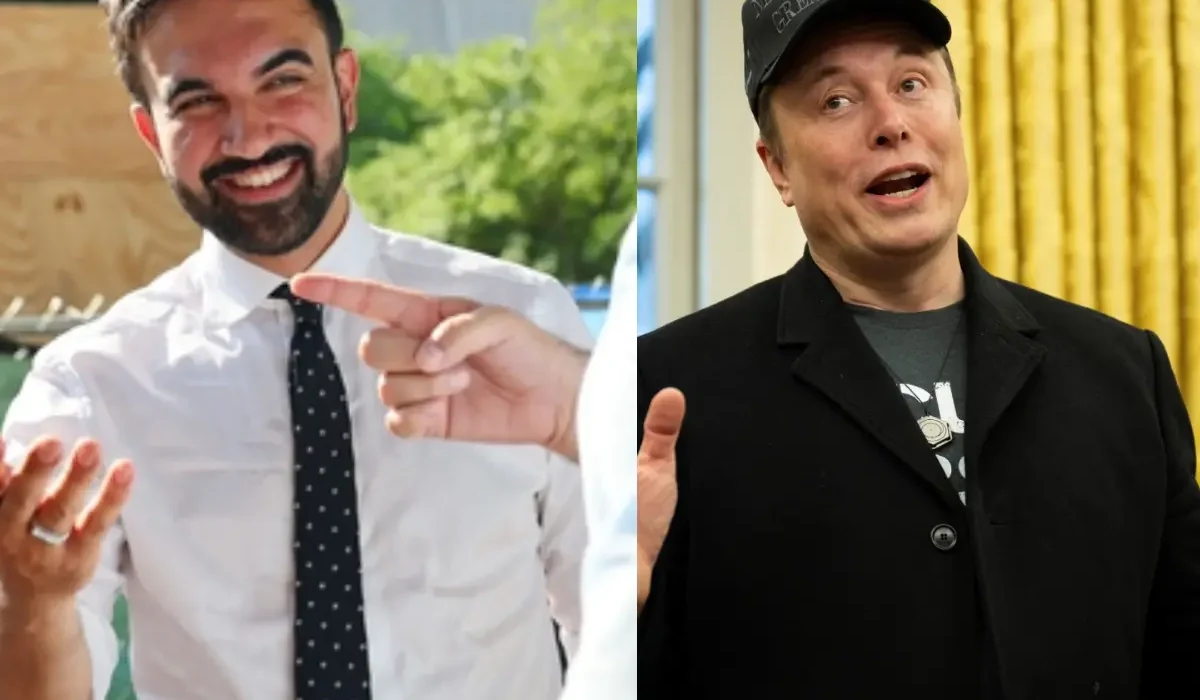
Fascism in Full View: Trump Threatens Citizenship of Critics Like Mamdani and Musk.
Posted in :
Trump’s threats to strip critics like Musk and Mamdani of their U.S. citizenship push America closer to authoritarianism, weaponizing denaturalization for political ends. Experts argue such actions lack legal basis but signal a dangerous erosion of democratic norms.
Donald Trump’s escalated threats to strip citizenship from Elon Musk and Zohran Mamdani reflect a shift toward using denaturalization as a tool of political retribution. This blog post dissects the unprecedented nature of these threats, explores the historical and legal context, and analyzes how they fit into a broader authoritarian trend targeting dissent and minorities in the U.S.
There are days when American politics feels like living inside a cautionary dystopian novel. Take, for instance, the spectacle of a U.S. president openly floating the idea of stripping citizenship from critics and dissenters. It’s enough to make anyone check the calendar twice. Just last week, the headlines screamed: Trump threatens to denaturalize outspoken voices like Elon Musk and Zohran Mamdani. For naturalized citizens everywhere—and anyone who values a functioning democracy—that’s more than a headline. It’s a wakeup call.
Section 1: Denaturalization as a Political Weapon – A New Age of Retaliation?
The Trump denaturalization threat has moved far beyond its original intent of safeguarding national security or addressing immigration fraud. Instead, it is now being wielded as a tool to intimidate and punish political dissenters. Recent high-profile cases, such as those involving Zohran Mamdani and Elon Musk, highlight a disturbing shift: denaturalization is no longer just about law enforcement—it’s about political retribution.
From Security Measure to Political Weapon
Historically, denaturalization in the U.S. was reserved for extreme cases—such as proven acts of terrorism, war crimes, or clear immigration fraud. The process was rare and typically required substantial evidence that the individual had lied or concealed material facts during their naturalization. However, the rhetoric around Mamdani denaturalization and the threats against Musk show a new pattern. Now, political disagreements and public criticism of government policy are being cited as grounds for stripping citizenship.
Research shows that the Department of Justice (DOJ) has recently issued memos giving U.S. attorneys broader discretion to pursue denaturalization, not just for criminal acts, but also to advance the administration’s policy objectives. This shift means that denaturalization can be used to police immigrants’ free speech and political dissent, rather than focusing solely on legitimate security concerns.
Targeting Political Dissenters: The Cases of Mamdani and Musk
The Trump administration’s threats against Zohran Mamdani and Elon Musk are clear examples of this new approach. Mamdani, a naturalized citizen since 2018, is a New York City mayoral candidate known for his outspoken criticism of U.S. immigration enforcement and his solidarity with pro-Palestinian causes. Republican officials have called for Mamdani’s denaturalization, accusing him—without evidence—of “material support for terrorism” based on his public statements and activism.
Elon Musk, who became a U.S. citizen in 2002, has also found himself in Trump’s crosshairs after publicly criticizing Trump’s economic policies. Trump’s public suggestion that Musk “close up shop and head back home to South Africa” is a striking example of how denaturalization threats are being used as a form of political retaliation. These cases demonstrate how the Trump denaturalization threat is increasingly directed at those who challenge or oppose the administration, rather than individuals who pose genuine threats to national security.
Historical Echoes: Red Scare and Authoritarian Regimes
There are unsettling parallels between today’s denaturalization rhetoric and past periods of ideological purges in American history. During the Red Scare and World War II, hundreds of naturalized citizens were stripped of their citizenship each year—often for their political beliefs or associations, not for any criminal wrongdoing. Between 1926 and the mid-1940s, denaturalization became a tool for targeting communists, anarchists, and others deemed “un-American.”
This pattern is not unique to the U.S. Authoritarian regimes throughout history, including Nazi Germany, have used denaturalization as a weapon to silence dissent and remove political enemies. The current climate, where citizenship can be threatened on the basis of political speech or activism, echoes these dark chapters.
Legal Limits and Expert Warnings
Under current U.S. law, denaturalization is supposed to be limited to cases where citizenship was obtained through fraud or where the individual has committed serious crimes such as treason. Neither Mamdani nor Musk fits these criteria. Legal experts are sounding the alarm about the misuse of denaturalization powers. As Michael Kagan, a law professor at the University of Nevada, Las Vegas, explains:
“This appears to be irresponsible rhetoric designed to intimidate political opponents.”
Despite these legal boundaries, the DOJ’s new approach and the Supreme Court’s recent decisions have created an environment where denaturalization can be used more aggressively. The Trump denaturalization threat, once a fringe idea, is now a central part of the administration’s authoritarian citizenship strategy.
Weaponizing Citizenship: A Warning Sign
The cases of Mamdani and Musk are not isolated incidents. They are part of a broader trend where denaturalization is being repurposed as a political weapon. This shift signals a dangerous move toward fascism in the U.S., where citizenship—and the rights it protects—can be revoked for dissent.
Section 2: Legal Limits and Historical Realities – Can Trump Really Strip Citizenship?
The recent Musk deportation threat and calls to revoke the citizenship of critics like Zohran Mamdani have sparked urgent questions about the true power of the executive branch—and the actual legal limits on denaturalization. While the Trump administration and its allies have floated the idea of using denaturalization proceedings as a tool against political opponents, the reality is far more complex and constrained than their rhetoric suggests.
Denaturalization Law: What Does It Really Allow?
Under current U.S. law, denaturalization is not a tool for punishing dissent or silencing critics. The law is clear: a naturalized citizen can only lose their citizenship if the government proves they obtained it through fraud, willful misrepresentation, or illegal procurement. Alternatively, citizenship can be revoked for acts of treason, terrorism, or serving in a foreign military or government hostile to the United States.
Political views, activism, or even public criticism of the government do not meet the legal threshold for denaturalization. This is not just a matter of policy—it is a matter of constitutional protection, reinforced by decades of Supreme Court precedent.
Supreme Court Precedent: The Afroyim Standard
The Supreme Court’s 1967 decision in Afroyim v. Rusk fundamentally changed the landscape. The Court ruled that the government cannot involuntarily strip a citizen of their status unless there is clear evidence of fraud or criminal acts related to the naturalization process. Voting in a foreign election, for example, is not enough. The Court made it clear: citizenship is a right, not a privilege to be revoked for political convenience.
Since Afroyim, the Court has consistently limited the government’s ability to revoke citizenship, emphasizing the need for due process and strong evidence. This means that threats to DOJ revoke citizenship for political reasons are, in practice, legally toothless.
Recent DOJ Memos: Expanding the Envelope, But Not the Law
Despite these legal boundaries, the Trump-era Department of Justice issued memos encouraging U.S. attorneys to pursue denaturalization cases more aggressively. The June 2024 memo instructs prosecutors to prioritize civil denaturalization proceedings in cases of illegal procurement or willful misrepresentation. It also gives wide discretion to pursue cases that align with “administration policy objectives.”
However, research shows that even with this more aggressive stance, actual denaturalization remains rare. Most cases involve clear-cut fraud or undisclosed criminal convictions—such as the recent case of Elliott Duke, who was denaturalized after being convicted of child pornography charges he failed to disclose. The expert consensus is clear: “Denaturalization is limited to cases where the government can prove material fraud in their original applications.” (Michael Kagan, UNLV)
Musk and Mamdani: Do They Meet the Criteria?
Examining the facts, neither Elon Musk nor Zohran Mamdani comes close to meeting the legal requirements for denaturalization. Musk, naturalized in 2002, has faced questions about his early work status, but he maintains he was always in compliance with visa rules. No evidence has surfaced of fraud or criminality in his naturalization process.
Mamdani, who became a citizen in 2018, is accused by political opponents of “material support for terrorism” based on his public statements and activism. Yet, expressing solidarity with controversial figures or criticizing U.S. policy does not constitute fraud or treason under the law. The Supreme Court’s protections against politically-motivated denaturalization remain robust, even in the face of heated rhetoric.
Due Process: A High Bar for Revoking Citizenship
Even when the DOJ revoke citizenship is pursued, due process protections make it a lengthy and difficult process. The government must present clear and convincing evidence in court. Defendants have the right to legal representation and to challenge the evidence against them. As a result, successful denaturalization proceedings are exceedingly rare—especially when the alleged grounds are political, not criminal.
The Bottom Line: Legal Safeguards Still Stand
While the Trump administration’s threats may serve as a warning shot to critics and immigrants, the law remains firmly on the side of due process and constitutional rights. The Trump Supreme Court immunity ruling may embolden executive overreach, but when it comes to stripping citizenship, the legal and historical realities set a high bar—one that neither Musk nor Mamdani comes close to crossing.
Section 3: Fascism in Full View – Authoritarian Blueprints and the Dangers Ahead
The United States is witnessing a dangerous shift in its political landscape, where the threat of fascism in the U.S. is no longer a distant warning but an immediate reality. Recent statements by Donald Trump, targeting the citizenship of critics like Zohran Mamdani and Elon Musk, signal a chilling new strategy: using the power of the presidency to intimidate, silence, and punish dissenters. This approach, now emboldened by the Supreme Court’s decision to grant Trump broad immunity, raises urgent questions about the political implications for democracy and the future of citizenship in America.
Trump’s remarks are not isolated outbursts. They reflect a calculated authoritarian blueprint—one that leverages fear, expands executive power, and undermines the very checks and balances designed to protect American democracy. The Supreme Court’s recent rulings, including the limitation of district courts’ ability to issue nationwide injunctions, have made it increasingly difficult to check executive overreach. This legal shift gives the executive branch unprecedented latitude to pursue policies that target minorities, critics, and political opponents.
The cases of Mamdani and Musk illustrate how denaturalization, once a rare and extreme measure, is being weaponized as a tool of political retaliation. Mamdani, a naturalized citizen and outspoken advocate for immigrant rights, has been smeared with Islamophobic rhetoric and accused—without evidence—of supporting terrorism. Republican officials have called for his denaturalization and deportation, citing his political activism and solidarity with controversial figures. Meanwhile, Trump’s threats against Musk, a former ally turned critic, have focused on his immigrant background, suggesting that political disagreement could be grounds for revoking his citizenship.
These actions echo historical patterns seen in other authoritarian regimes, where legal tools are twisted to punish dissent and consolidate power. As research shows, denaturalization in the U.S. was once used during the Red Scare and World War II to expel communists and perceived enemies. Notable examples include Emma Goldman and Paul Knauer, both stripped of citizenship for their political beliefs or associations. The Supreme Court’s 1967 ruling in Afroyim v. Rusk was meant to end such abuses, restricting denaturalization to cases of fraud or treason. Yet, the current administration appears eager to test those limits, signaling a return to darker chapters of American history.
What makes this moment especially alarming is the intersection of racist and Islamophobic undertones with the mechanics of state power. Mamdani is targeted not just for his politics, but for his identity—as a Muslim and a child of immigrants. Musk’s South African origins are wielded as a political weapon. These tactics are designed to stoke fear among minority communities and send a message: dissent will not be tolerated, and citizenship is conditional.
The Department of Justice’s recent memos, which prioritize denaturalization for those who “advance the Administration’s policy objectives,” further illustrate this authoritarian turn. Studies indicate that denaturalization is now being pursued not only for serious crimes, but also for procedural errors or political dissent—an escalation that threatens the constitutional rights of millions of Americans. The Supreme Court’s willingness to grant Trump near-unchecked power only accelerates this trend, eroding the safeguards that once protected against executive abuse.
In the words of one observer,
“We are watching a man with fascist impulses use the levers of power to strip critics of citizenship—enabled by a Supreme Court that no longer believes in checks and balances.”
This is not hyperbole. The current threats to denaturalize critics and immigrants mirror the early moves of fascist regimes, where legalistic justifications mask a deeper drive to silence opposition and reshape the nation’s identity.
The political implications are profound. If left unchecked, these authoritarian tactics could become the new normal, putting journalists, activists, and ordinary citizens at risk. The fight for democracy and true citizenship—one that is not conditional on political loyalty—has never been more urgent. As fascism in the U.S. moves from rhetoric to reality, the time to defend constitutional principles and resist authoritarianism citizenship is now.
TL;DR: Trump’s threats to strip critics like Musk and Mamdani of their U.S. citizenship push America closer to authoritarianism, weaponizing denaturalization for political ends. Experts argue such actions lack legal basis but signal a dangerous erosion of democratic norms.
TrumpDenaturalizationThreat, MuskDeportationThreat, MamdaniDenaturalization, TrumpSupremeCourtImmunity, FascismInTheU.S, DOJRevokeCitizenship, DenaturalizationProceedings, USImmigrationStatus, PoliticalImplications, AuthoritarianismCitizenship,weaponizedcitizenship, Mamdanidenaturalization, Muskdeportationthreat, fascisminAmericanpolitics
#DenaturalizationDebate, #ImmigrationJustice, #FascismWatch, #TrumpEra, #SupremeCourt, #MuskDeportation, #MamdaniDenaturalization, #DOJPolicy, #PoliticalRetaliation, #USCitizenship,#Trump, #Mamdani, #ElonMusk, #Denaturalization, #Fascism, #SupremeCourt, #Racism, #Authoritarianism

